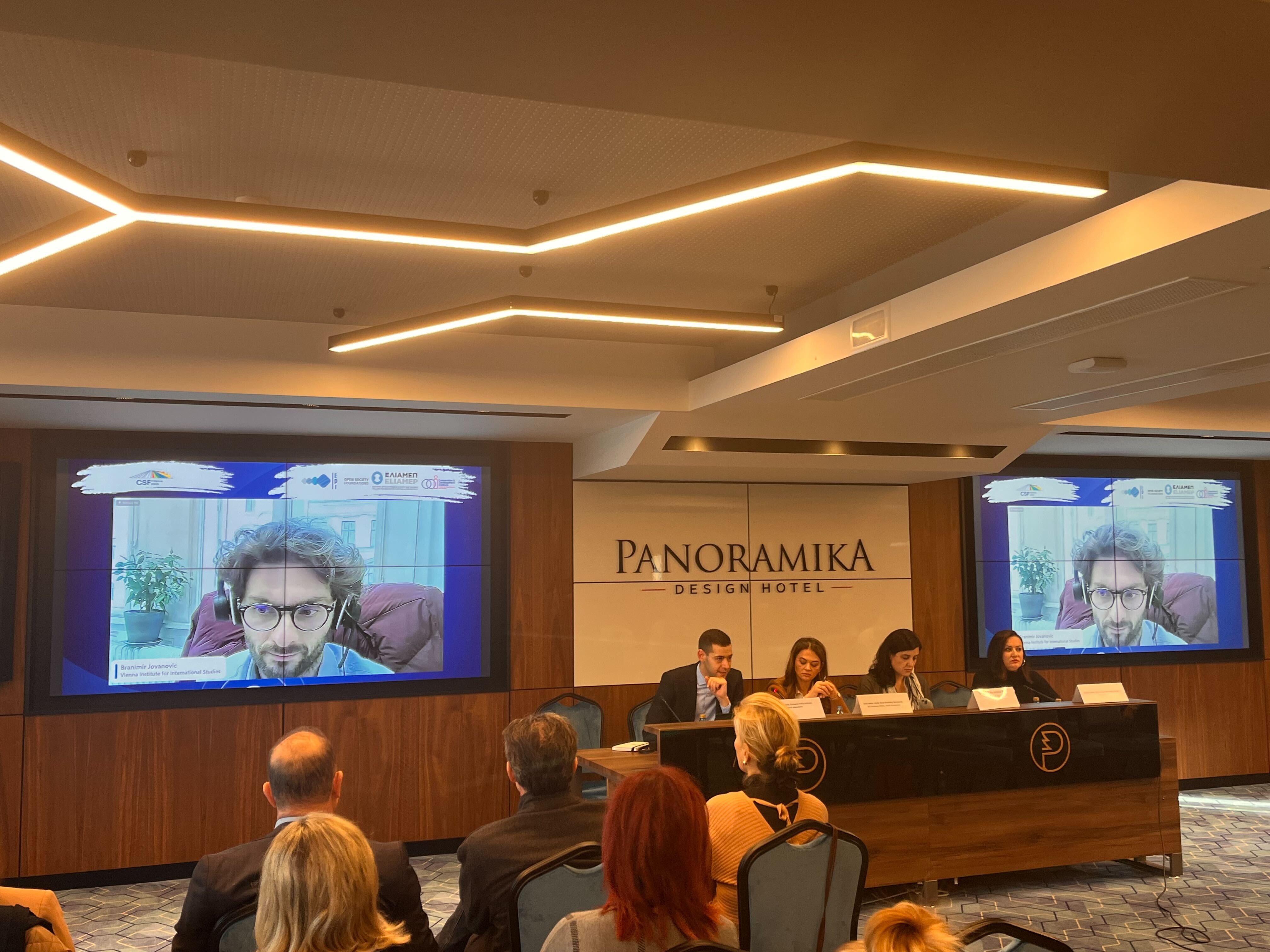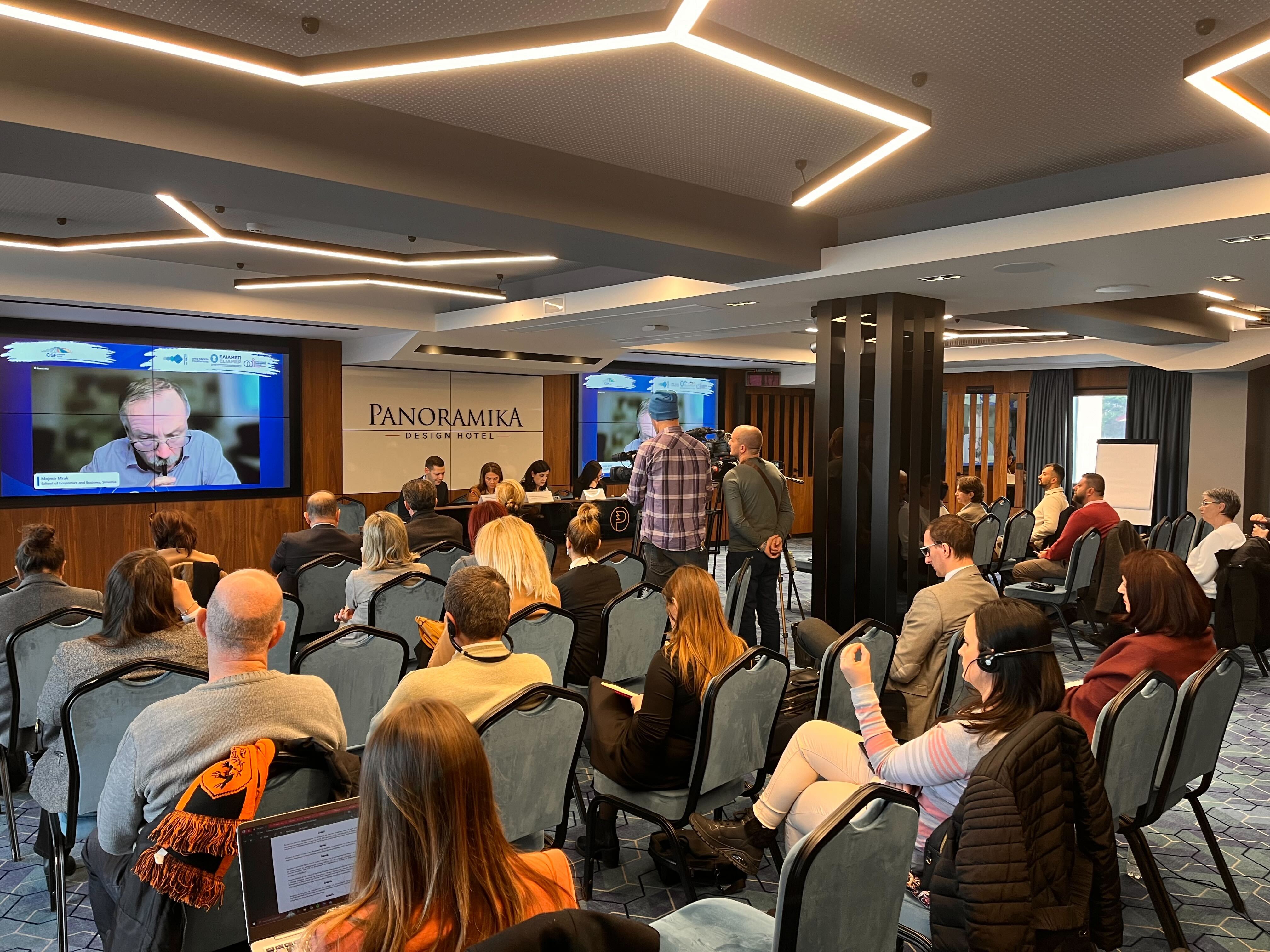Event report: Growth Plan for the Western Balkans: how to make it work for all?
On December 21, 2023, the European Policy Institute – Skopje (EPI) hosted this hybrid event, conducted both in Skopje and via Zoom. It served as a culmination of EPI’s coordination efforts within the working group on access to the European Union’s (EU) single market for the Western Balkan countries, part of the Berlin Process Civil Society Forum. Supported by the Open Society Foundations of the Western Balkans, this endeavour commenced in May-June and engaged over 40 organisations and experts in crafting recommendations. These recommendations were formally presented in October at the Berlin Process Civil Society Forum.
The event provided a platform for critical reflection and dialogue surrounding the proposed Growth Plan by the European Commission. Central to the discussion was the plan’s potential to enhance the economic governance framework and facilitate the alignment of Western Balkan candidate countries with the economic criteria of the accession process. Gathering policymakers, civil society representatives, academia, and business sector stakeholders, the aim was to deliberate on how best to navigate the implementation of the Growth Plan within the region’s unique circumstances and constraints. The overarching objective was to uncover actionable insights that position the Growth Plan as a transformative opportunity for the Western Balkans.
The panel discussion at this event featured a diverse array of speakers, including Drita Abdiu-Halili, State Secretary at the Secretariat for European Affairs of North Macedonia; Bojan Vujovic, Acting General Director in the Ministry of European Affairs of Montenegro; Mojmir Mrak, Professor at the School of Economics and Business in Ljubljana; Zsolt Darvas from the Bruegel think-tank from Belgium and the Corvinus University of Budapest; Branimir Jovanovic from the Vienna Institute for International Studies; and Radica Koceva, IPA management expert from North Macedonia.
The moderator kicked off the conversation by directing the initial query to Drita Abdiu-Halili, inquiring about the government’s reception of the Growth Plan. Additionally, he sought insights into North Macedonia’s progress in preparing the reform agenda and requested details on the reform priorities proposed to the Commission.
In response, Abdiu-Halili conveyed that the Growth Plan wasn’t perceived as “business as usual” within the government. Initially, there were apprehensions that it might follow the pattern of past initiatives, starting with promise but ultimately stagnating. However, there was a notable shift in dynamics, with widespread acceptance from all sides, including the European Commission and all Western Balkan countries. Rather than viewing the plan as a mere conditionality-driven process, the government embraced it as an opportunity and a bridge toward experiencing EU accession benefits before full membership—a long-discussed aspiration. The Commission’s articulation of a concrete plan resonated with the desires of Western Balkan countries for tangible and visible results. To ensure effective implementation, the government established a clear administrative structure, led by the Deputy Prime Minister for EU Affairs and the Minister of Finance, with relevant ministries aligning their efforts according to priorities. Expert-level administrations were nominated across institutions to complete an outline submitted to the Commission on December 6. Identified policy areas include governance, digitalisation, energy and green transition, human capital, business environment, and rule of law. Collaboration with stakeholders, including civil society, business, and academia, will be pivotal in translating the plan into concrete projects. The process, albeit marked by some uncertainties, will be characterised by a learning-by-doing approach. Cooperation within the region was underscored as exemplary. The timeline from January to March will be dedicated to refining plans and navigating the procedural steps required for endorsement by all EU member states.
Professor Mojmir Mrak from the School of Economics and Business in Slovenia highlighted the importance of pre-EU accession funding to prevent overwhelming financial burdens post-accession, as witnessed in Croatia’s case. He compared the Growth Plan to the Next Generation EU Fund seen in Member States post-coronavirus, emphasising their uniqueness and temporary nature, as it will not be an annual exercise. He also underscored the uniqueness of the Growth Plan because of its focus on both socioeconomic issues and fundamental reforms. He raised concerns about the two distinct avenues for implementation outlined in the draft regulation, as it remains unclear how these will be coordinated, whether delays in one segment will affect the other, and how benchmarks will be managed. He questioned the rationale behind allocating structural reform funds exclusively from loans, while investments will receive a mix of both grants and loans, as implementing reforms is much more challenging, especially if there are insufficient incentives for it. He further underscored that unlike Economic Reform Programs, the reform agendas under this initiative must be agreed upon with the Commission, potentially involving also the Council.
Zsolt Darvas, Bruegel, Belgium, and Corvinus University of Budapest, Hungary considered that potential political risks that could hinder the operationalisation of the Growth Plan are low. He highlighted two reasons for this optimism: firstly, the grant component of the plan constitutes a relatively small portion of the EU budget annually, and secondly, given the substantial support provided to Ukraine in the wake of the conflict with Russia, there is a perceived need to extend support to the Western Balkans as well. He echoed the concerns raised by Professor Mrak regarding the puzzling aspect of offering only loans for the more challenging reform component, while grants are allocated to investments. He emphasised the difficulty of implementing crucial reforms in areas like the rule of law and public administration and suggested that grants for major reforms would provide a stronger incentive for countries to address these challenges.
Drawing from the EU’s experience, Darvas differentiated between the European Semester process and the new Next Generation EU, including the recovery and resilience facility. He noted that the European Semester process has had a relatively poor implementation record, as countries often did not implement recommendations unless under market pressure or aligned with political agendas. In contrast, the recovery and resilience facility’s focus on meeting milestones and targets for funding has led to greater efforts from EU countries, although they are still lagging behind. Drawing parallels between the Growth Plan and the recovery and resilience facility, Darvas anticipated a high level of implementation for the investment component of the Growth Plan but expressed skepticism about whether loans would provide sufficient incentives for difficult fundamental reforms.


Branimir Jovanovic from the Vienna Institute for International Studies, who expressed reservations with the Growth Plan, has expressed scepticism that the Growth Plan can deliver substantial change of the EU’s behaviour towards the region. While he sees the plan as a step in the right direction, he deems it very limited and insufficient. Jovanovic emphasised the importance for the Western Balkans to gain access to the EU single market, including the four freedoms, but noted that the plan’s current provisions are limited to free roaming and financial flow, falling short of addressing key issues faced by Balkan companies in accessing the European market, such as customs procedures and non-tariff barriers.
Regarding the financial aspects of the plan, Jovanovic questioned its expected impact, noting that while the plan proposes 6 billion euros in additional funding, the previous Economic and Investment Plan of 30 billion euros did not lead to significant change. He highlighted the disproportionately low grant allocation for the Western Balkans compared to neighbouring countries such as Croatia, which receive substantially more funding from Next Generation EU, citing it as insufficient to drive meaningful change in the region.
Despite his criticism, Jovanovic acknowledged the need to make the most of the plan and suggested focusing on easing bureaucracy and providing more support for companies to meet technical standards and certifications. He concluded by noting that without a stronger incentive, such as a larger financial support or a real deadline for accession, the plan’s impact on reforms in the region is likely to be insignificant.
Radica Koceva, expert with technical experience both within and outside institutions working on various EU projects. began by outlining three main challenges, which she believed were common across all Western Balkan countries. Firstly, she emphasised the need for sufficient political commitment to implement the reforms outlined in the Growth Plan, noting the historical lack of success in this area. Secondly, she highlighted the issue of insufficient administrative capacity within the public administration to effectively carry out the reforms, stressing the need for further strengthening in this regard. Thirdly, Koceva addressed the imbalance between grant funding and loans within the Growth Plan, expressing concern over the increased indebtedness of countries in the region. She stressed the importance of coordination mechanisms to ensure effective implementation and highlighted the need for political commitment and skills within the public administration to address the challenges associated with large infrastructure projects. She also expressed some pessimism regarding the potential for significant changes on the ground without the fulfilment of key prerequisites outlined in the Growth Plan. She underscored the importance of creating and implementing reform programs to disperse funds effectively.
Bojan Vujovic, Acting General Director in the Ministry of European Affairs, Montenegro, provided insight into Montenegro’s perspective on the Growth Plan. He began by acknowledging initial doubts regarding the initiative’s value for the accession process and economic convergence of the region. However, witnessing the development of discussions and the proposal from the European Commission has instilled more optimism. Vujovic emphasised the significance of the economic dimension of the accession process for Montenegro and expressed enthusiasm for the process’s development. The Montenegrin government has taken initial steps in preparing the reform agenda, engaging in discussions on a draft document proposed jointly with the Commission.
Regarding the amount of available funding, Vujovic considered it fair, though acknowledging it may not fully cover all needs. Nonetheless, he sees it as an additional value alongside existing IPA funds. Montenegro’s reform agenda focuses on competitiveness, digital and energy transition, green transition, and human capital development, with a horizontal emphasis on the rule of law. Vujovic acknowledged lingering doubts about the operational development of the plan by the Commission and its reception by member states in the Council and Parliament. However, he believes it’s the Commission’s responsibility to persuade member states of its necessity for the region. Ultimately, Vujovic emphasised the need to see specific benefits of the Growth Plan for Montenegro and the region as a whole, noting there are still many open questions to be addressed.





